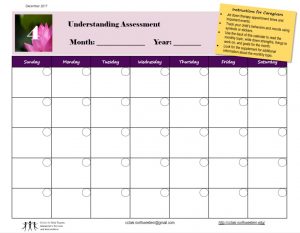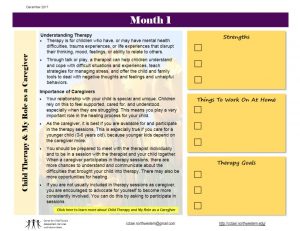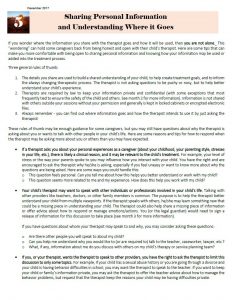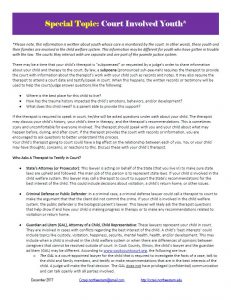Caregiver Advocacy Resource for Engagement (C.A.R.E.) Calendar
Purpose
Flexibility
Each part of the C.A.R.E. Calendar resource can be used on its own or all together. For example, some may only use the monthly calendar to provide structure and a space for tracking behaviors. Others may simply read the supplements to learn more about a particular topic. Families and clinicians can choose the parts of the calendar that are most relevant to them.
Monthly Topics
- Child Therapy & My Role as a Caregiver
- Understanding Confidentiality
- Being an Informed Caregiver
- Understanding Assessment
- Sharing Personal Information and Knowing Where It Goes
- Telling My Caregiver Story
- Assessment Feedback
- Child Advocacy: Partnering with Your Child’s Therapist
- Tracking & Communicating Between Sessions
- The Challenge of Advocacy & Overcoming Barriers
- I’m Stressed, Too – What Do I Do? Caregiver Self-Care
- Completion & Next Steps
What’s Included
Monthly Calendar - Front
 The front page of the C.A.R.E. Calendar provides daily spaces to document any appointments, important events or experiences that may impact the child. Parents/caregivers may also use the space to track moods and behaviors. Parents/caregivers can share this data with their clinician to better understand patterns and make informed decisions on behalf of the child.
The front page of the C.A.R.E. Calendar provides daily spaces to document any appointments, important events or experiences that may impact the child. Parents/caregivers may also use the space to track moods and behaviors. Parents/caregivers can share this data with their clinician to better understand patterns and make informed decisions on behalf of the child.
Monthly Calendar - Back
 The back of the Monthly Calendar page includes space to identify strengths, things to focus on at home, and goals for therapy. It also has one of 12 informational topics that explain the “ins and outs” of therapy. These include tips and ideas on how to support your child, understand what happens in therapy, and address your own stress!
The back of the Monthly Calendar page includes space to identify strengths, things to focus on at home, and goals for therapy. It also has one of 12 informational topics that explain the “ins and outs” of therapy. These include tips and ideas on how to support your child, understand what happens in therapy, and address your own stress!
Monthly Supplement
 The Monthly Supplement is an additional reading to provide greater detail about each monthly topic. It offers more in-depth information as well as related articles or websites. The supplements are optional for those who want to learn more about a certain topic.
The Monthly Supplement is an additional reading to provide greater detail about each monthly topic. It offers more in-depth information as well as related articles or websites. The supplements are optional for those who want to learn more about a certain topic.
Special Topics
 In addition to the Monthly Supplements, CCTASI developed two additional resources to provide information about common situations that not every child and family encounters. These include “Psychotropic Medication” and “Court-Involved Youth (Child Welfare Involved Youth and Legal Dependents).”
In addition to the Monthly Supplements, CCTASI developed two additional resources to provide information about common situations that not every child and family encounters. These include “Psychotropic Medication” and “Court-Involved Youth (Child Welfare Involved Youth and Legal Dependents).”
Child Therapy Glossary
The Child Therapy Glossary was created to help explain terms used in child therapy that may be confusing or difficult to understand. The glossary includes words that are used in the calendar and supplemental readings. It also includes terms often used by child therapists or professionals in therapy settings.
